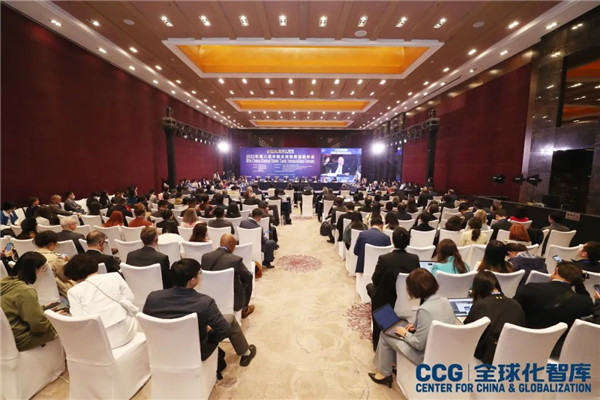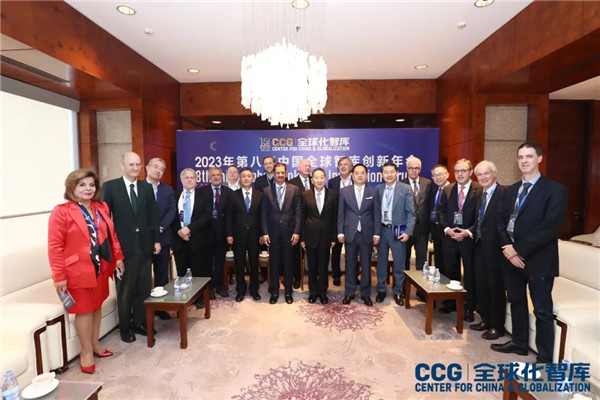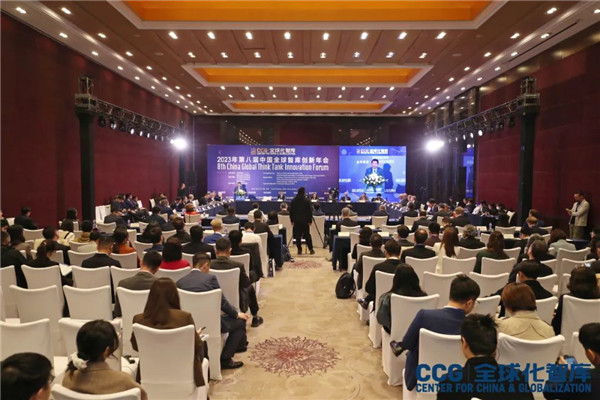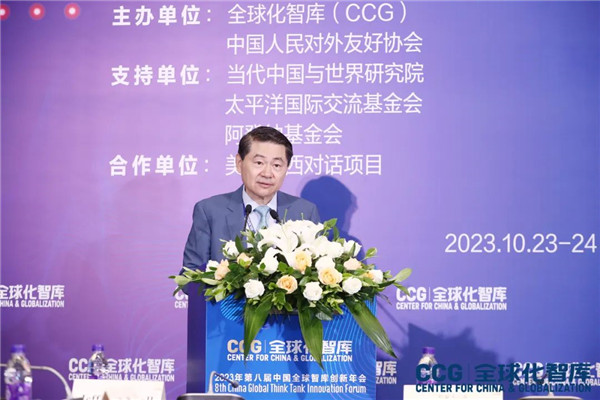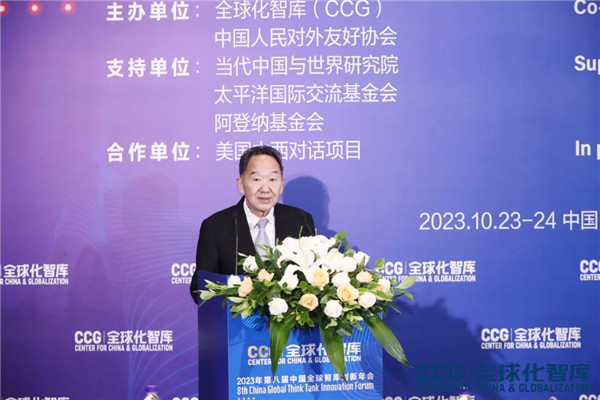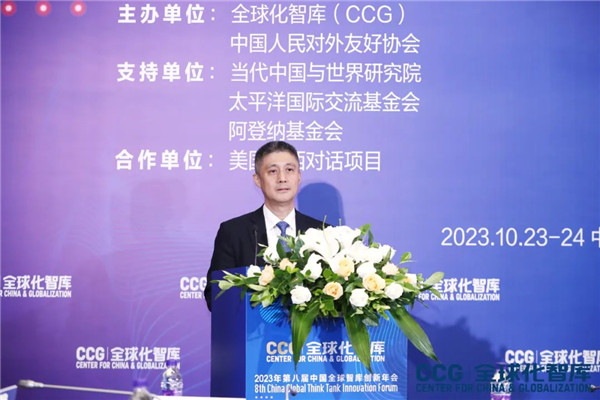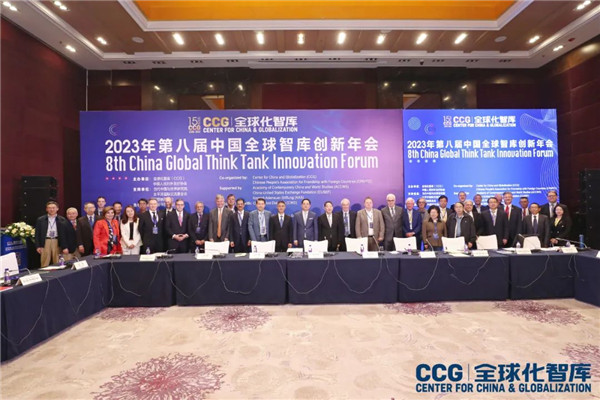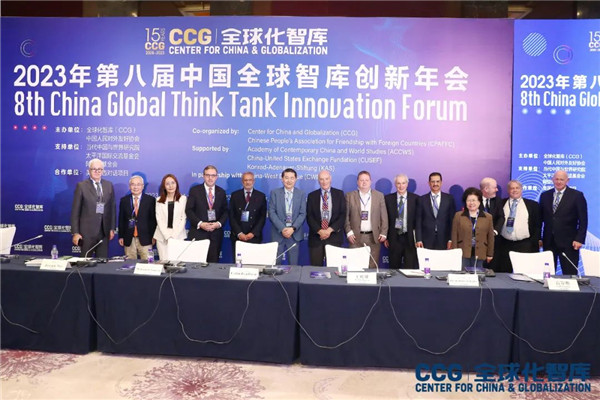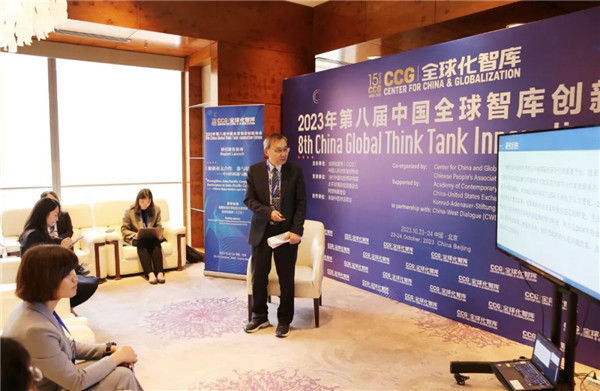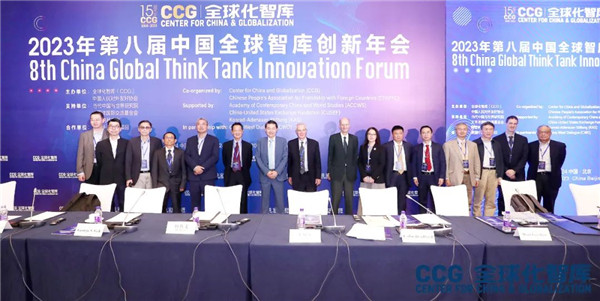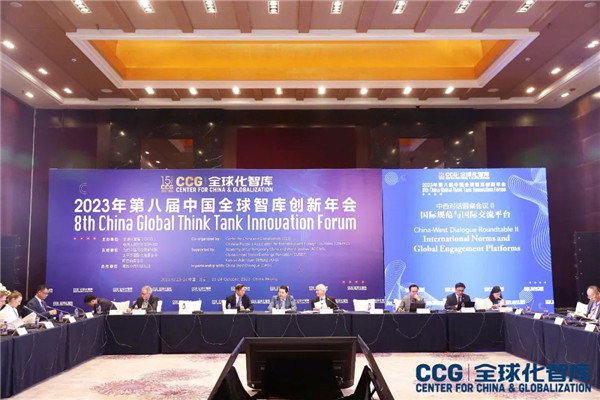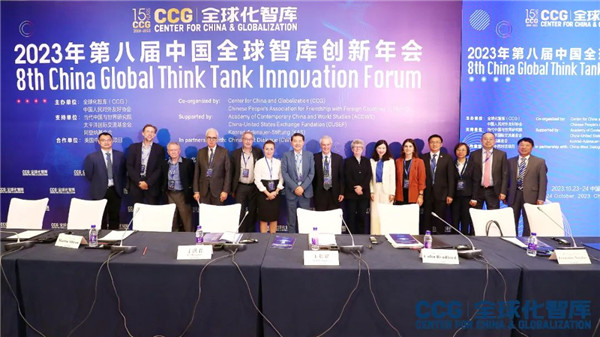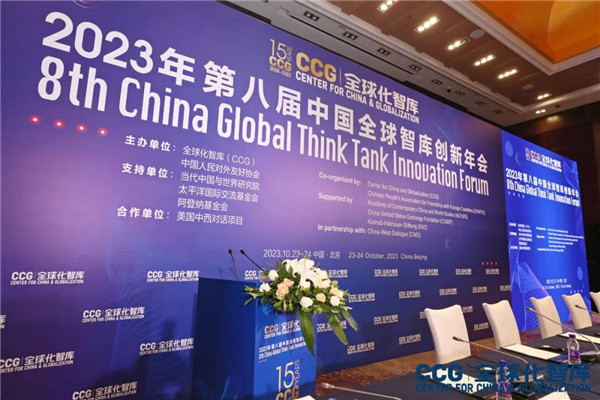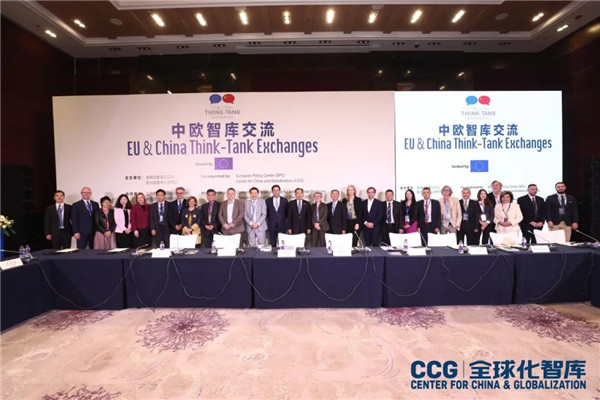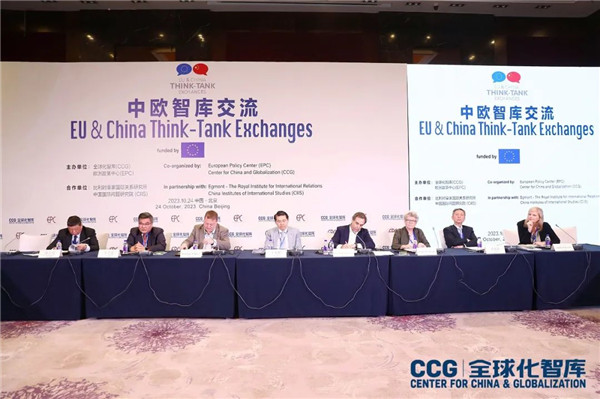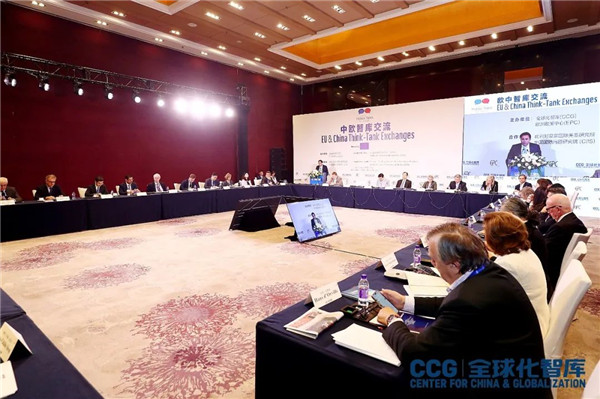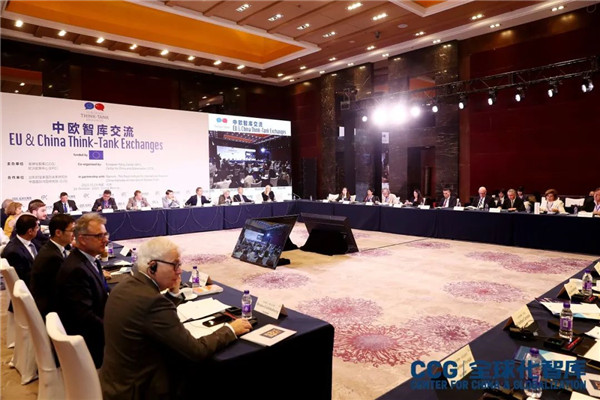CCG Holds 8th China Global Think Tanks Innovation Forum
Videos | 8th China Global Think Tank Innovation Forum
The 8th China Global Think Tank Innovation Forum was successfully held in Beijing from October 23-24, 2023, jointly organized by CCG and The Chinese People’s Association for Friendship with Foreign Countries (CPAFFC). The was the largest in-person exchange for international think tanks in China in the past four years, with nearly 100 representatives from world-renowned think tanks in over 20 countries and regions including China, the US, the UK, Canada, India, Australia, Europe, Asia, Latin America, Africa and the Middle East gathered to exchange perspectives on global trends, formulate solutions to global challenges, and envision the more pluralist future.
Over the past three years, interactions between China, the US, and Europe have profoundly impacted the direction of global politics and economics, with fluctuations in bilateral and trilateral relations bringing unprecedented instability. With the relaxing of China’s pandemic related measures, face-to-face interactions between Chinese and foreign leaders have gradually resumed. Since this spring, a steady stream of European leaders have visited China to promote peaceful resolution of the Ukraine situation through bilateral cooperation and global collaboration. In recent months, issues such as de-risking, the Ukraine situation, and global governance have once again become a focus of public attention as China-US relations began showing initial signs of warming.
In the opening remarks at the forum, CCG President Wang Huiyao first extended a warm welcome to all guests. He noted that geo-political issues are intensifying worldwide, anti-globalization feeling is on the rise and tremendous changes and transformations are imminent, which requires cooperation to explore a way forward. He remarked that the conference would focus on key issues such as global order, China-US relations and China-Europe relations and that he hoped those in attendance would be able contribute their own insights. He also reiterated CCG’s willingness to engage in sincere discussions with government officials, experts and think tank leaders attending this annual forum to jointly strive for a stable, harmonious, sustainable and prosperous future world.
In his welcoming speech, CPAFFC President Yang Wanming pointed out that this is the first time the Chinese People’s Association for Friendship with Foreign Countries has cooperated with CCG to host the Global Think Tank Innovation Forum. This opportunity has enabled CPAFFC and CCG to strengthen links and exchanges with think tanks around the world and lay a foundation for future dialogue and cooperation. He noted that as thinkers who create ideas and policies that shape public opinion and guide government policy, think tanks should contribute insights, expand influence of ideas, and implement pathways to serve building a community with a shared future for mankind through their work.
Jiang Jianguo, Standing Committee Member of the CPPCC National Committee, Deputy Director of the Ethnic and Religious Affairs Committee of the CPPCC National Committee, and Executive Vice President of the China Society for Human Rights Studies, pointed out that today’s era is full of contradictions and challenges. We need to respond to President Xi Jinping’s call to work together to built a community with a shared future for mankind as well as the Belt and Road Initiative and Three Great Initiatives. He emphasized survival as a prerequisite, development as the key, equality as a core principle, and respect as a universal foundation, noting that we should promote exchanges and cooperation between countries. Exchanges and cooperation between think tanks are an important part of people-to-people engagement. Think tanks should act as pioneers in promoting grassroots exchanges, wise advisors contributing insights, and benefactors that enhance humanity’s well-being. They should also be builders of consensus, international communication, as well as cultural and moral foundation.
In his special remarks, Gao Anming, Vice President and Editor-in-Chief of China International Publishing Group, stated that at the closing of the third Belt and Road International Cooperation Summit Forum last week, China stated that it will further “deepen civilizational dialogues with Belt and Road partner countries and strengthen multilateral cooperation platforms in think tanks and other areas”, which is an important part of the eight actions to support high-quality Belt and Road cooperation. Think tanks are creators of ideas, producers of knowledge, and guides for trends and directions of the times as well as drivers of policies. They should take more proactive responsibilities in promoting exchanges and resolving conflicts between civilizations, while also building a community with a shared future for mankind to face major global challenges and urgent crises together.
The first roundtable session was given the theme “Crossroads of Global Order: The Way Forward” and was chaired by CCG President Wang Huiyao. In recent years, conflicts such as Russia-Ukraine and Israel-Palestine have divided the world into different camps, deepening global fragmentation. At this crossroads, a distinguished panel of experts and leaders gathered to exchange views on reaching consensus and exploring paths forward to address global challenges. Roundtable panelists included:
Rong Ying, Vice President of China Institutes for International Studies (CIIS)
Colin Bradford, Nonresident Senior Fellow of the Global Economy and Development Program, The Brookings Institution; Co-Lead, the China-West Dialogue
Fabian Zuleeg, Chief Executive, European Policy Centre
H.E. Dr. Khalid Al Khater, Director of Policy Planning Department at Ministry of Foreign Affairs, State of Qatar
Erik Solheim, Vice Chairman, Europe-Asia Center; former Under-Secretary-General of UN
Chen Wenling, Chief Economist, China Center for International Economic Exchange (CCIEE)
Mohamed Amersi, Founder and Chairman of the Amersi Foundation
Bruno Liebhaberg, Director General, Centre on Regulation in Europe (CERRE)
Michael Pillsbury, Senior Fellow, The Heritage Foundation
SHI Yinhong, Chairman of Academic Committee of the School of International Studies, Renmin University of China
James Laurenceson, Director, Australia-China Relations Institute (ACRI), University of Technology Sydney
Wang Yong, Professor and Director of Center for American Studies, Peking University
Doug Bandow, Senior Fellow, CATO Institute
Gladden J. Pappin, President, Institute of Hungarian International Affairs
Sun Jisheng, Vice President, China Foreign Affairs University (CFAU)
Joseph Nye, University Distinguished Service Professor, Emeritus and former Dean of the Harvard’s Kennedy School of Government
Jeff Nankivell, President and CEO, Asia Pacific Foundation of Canada
In analyzing the way forward for China-US relations, the panelists unanimously believed that conflicts should be avoided in multilateral and bilateral relationships, maintaining communication and cooperation to jointly promote progress. Speakers also engaged in in-depth discussions on global governance issues such as environmental protection and sustainable development, emphasizing the importance of cooperation and practical topics such as low-carbon goals and electric vehicle development. At the same time, participants also recognized think tanks’ current and future role in shaping the changing landscape of global order, expressing the hope that private think tanks as important players in track-two diplomacy and global governance can build interconnecting bridges.
In recent decades, economic cooperation in the Asia-Pacific region has flourished dramatically, creating the widely acclaimed “Asia-Pacific miracle”. However, the imbalance in cross-Pacific trade and intensified competition among major countries, the risk of direct conflict between large countries in the Asia-Pacific region has increased, which not only threatens China’s external environment but also fails to meet the common goal of development and stability within countries in the region. Against this backdrop, a report titled “Strengthening Asia-Pacific Cooperation and Participating in Indo-Pacific Cooperation: Opportunities and Challenges for China” was released during forum, which was jointly produced by the Institute of Asia-Pacific Studies of Fujian Academy of Social Sciences and CCG. Focusing on the APEC Meeting in the United States in 2023, it put forth China’s response strategies with in-depth analysis of the impact of changes in the US Asia-Pacific strategies and policies on regional cooperation and integration in the Asia-Pacific.
Next, the first of two China-West Roundtables focused on “Exploring China-US and China-West Relations under a Vision of International Relations Multilateralism”, co-chaired by CCG President Wang Huiyao and Colin Bradford, Senior Fellow of the Global Economy and Development Program at the Brookings Institution and co-initiator of the China-West Dialogue. Attendees included:
Zhu Feng , Executive Dean of School of International Studies, Nanjing University
Michael Pillsbury, Senior Fellow, The Heritage Foundation
Fabian Zuleeg, Chief Executive and Chief Economist, European Policy Centre (EPC)
Ren Xiao, Professor, Institute of International Studies, Fudan University; Director, Centre for Chinese Diplomatic Studies
Cui Fan, Professor, University of International Business and Economics (UIBE)
Erik Balsbaugh, Senior Vice President, New Ground Strategies
Wang Lili, Deputy Dean of National Institute of Development and Strategy, Remin University of China
Matt Ferchen, Senior Research Scholar and Senior Fellow, Paul Tsai China Center at Yale University Law School
Heiwai Tang, Associate Dean, Business School of Hong Kong University
Emanuel Yi Pastreich, Director, The Asia Institute
He Weiwen, CCG Senior Fellow; former Commercial Counsellor at Chinese Embassy in New York and San Francisco
George S. Geh, Chief Executive Officer, China Institute in America
Jiang Shan, CCG Senior Fellow; former Director-General of MOFCOM Department of American and Oceanic Affairs
Xu Zhengzhong, Deputy Dean of Institute for International Strategic Studies, National Academy of Governance
Lü Xiang, CCG Senior Fellow; Specialist in American Studies, Chinese Academy of Social Sciences; Director, Research Department, Hong Kong China Academic Research Institute
Li Chen, Associate Dean, School of International Studies, Renmin University of China
All of the panelists agreed that that the world is facing increasing challenges and countries should work harder to built fundamental mutual trust. Pluralism is an inherent part of the international community, with each country having different political and economic systems, values, histories and cultures, butthese do not necessarily prevent cooperation. The key lies in properly handling differences between countries. Stability in China-US relations is hugely important for world stability and the word “competition” cannot describe the full picture of China-US relations, and both sides have a responsibility to work together.
The second China-West Roundtable focused on “International Norms and Platforms for International Exchanges”, co-chaired by CCG President Wang Huiyao and Colin Bradford, Senior Fellow of the Global Economy and Development Program at the Brookings Institution and co-initiator of the China-West Dialogue. Attendees included:
Bruno Liebhaberg, Director General, Centre on Regulation in Europe (CERRE)
Francoise Nicolas, Director of Center for Asian and Indopacific Studies, French Institute of International Relations (ifri)
Dai Rujun, Director of the Department of International Human Right Law at Institute of International law, Chinese Academy of Social Sciences
Shada Islam, Senior Adviser, European Policy Center
Su Hao, Founding Director of Center for Strategic and Peace Studies, China Foreign Affairs University (CFAU); CCG Nonresident Senior Fellow
LI Huailiang, Director, Institute for a Community with a Shared Future, Communication University of China (CUC)
Zhu Xufeng, Dean of School of Public Policy and Management, Tsinghua University
Tu Xinquan, Dean, China Institute for WTO Studies, University of International Business and Economics (UIBE)
Yu Hongjun, CCG Advisor; former Vice Minister, CPC International Department
Martin Albrow, Emeritus Professor of the University of Wales’ and ‘Fellow of the Academy of Social Sciences’ (FAcSS)
Christian Kastrop, Professor for Public Finance at the Free University Berlin; former State Secretary, Federal Ministry of Justice and Consumer Protection, Germany
Wang Yizheng, Jean Monnet Chair Professor and Director of International Affairs, Renmin University of China
CHEN Yang, Executive Director of Institute of European Studies, China Institutes of Contemporary International Relations (CICIR)
Tim Summers, Assistant Professor, The Chinese University of Hong Kong; former Chatham House Consultant Fellow
Gladden J. Pappin, President, Institute of Hungarian International Affairs
Peter Walker, Co-Chair, China Institute in America
Julia Ganter, Programme Director International Affairs; Editor-in-Chief, The Berlin Pulse, Körber-Stiftung
Zhang Wei, Co-Director, Professor of Law at Institute for Human Rights, China University of Political Science and Law
Agnes Michalik, Managing Director, The Global Solutions Initiative
Participants emphasized that countries in a pluralistic world should free themselves from mechanistic restrictions, overcome ideological obstacles, maintain communication and interaction, and make joint efforts to build lasting peace and common prosperity in a harmonious world.
The first day’s activities were supported by the Academy of Contemporary China and World Studies (ACCWS), the China-United States Exchange Foundation (CUSEF), and the Konrad Adenauer Foundation (KAS). These events were held in cooperation with the China-West Dialogue Project.
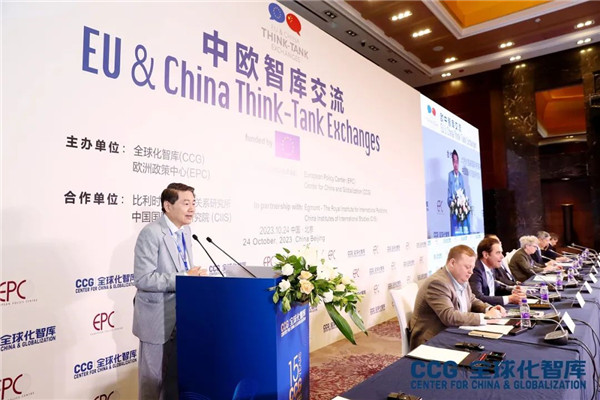 WANG Huiyao, President, CCG; former Counselor to the State Council
WANG Huiyao, President, CCG; former Counselor to the State Council
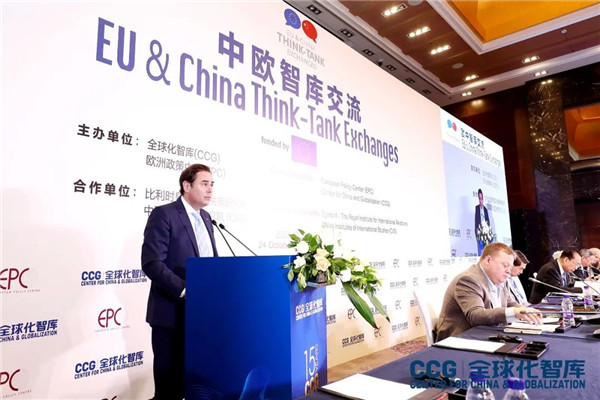 Amb. Jorge Toledo Albiñana, EU Ambassador to China
Amb. Jorge Toledo Albiñana, EU Ambassador to China
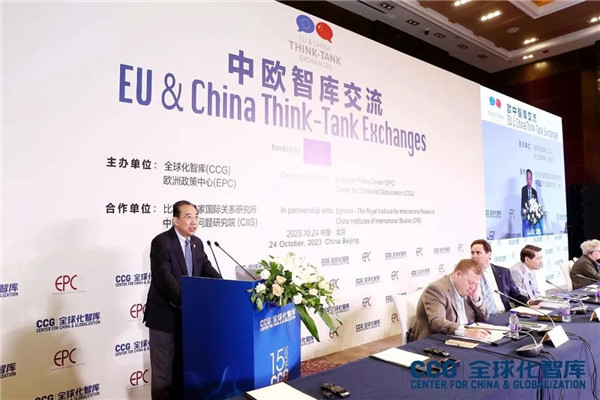 Amb. WU Hailong, President, China Public Diplomacy Association; former Chinese Ambassador to the EU
Amb. WU Hailong, President, China Public Diplomacy Association; former Chinese Ambassador to the EU
On October 24th, CCG co-hosted “EU & China Think-Tank Exchanges” with the European Policy Centre (EPC). CCG President and former State Council Researcher Wang Huiyao delivered the opening remarks, followed by speeches by EU Ambassador to China Jorge Toledo and Chinese former Ambassador to the EU Wu Hailong.
The first thematic discussion on “EU-China Relations: Review and Outlook” was moderated by Ricardo Borges de Castro, Vice President and Head of the “Europe in the World” Project at the European Policy Centre. Fabian Zuleeg, CEO and Chief Economist of the European Policy Centre, Janka Oertel, Director of the Asia Program at the European Centre for International Political Economy, Francoise Nicolas, Senior Research Fellow at the French Institute of International Relations and Head of the Center for Asian and Indo-Pacific Studies, Cui Hongjian, Professor at the Institute for Advanced Regional and Global Governance of the Beijing Foreign Studies University and Senior Fellow of CCG, Sun Yongfu, former Director-General of the Europe Department of the Ministry of Commerce and Senior Fellow of CCG, and Dai Changzheng, Dean of the School of International Relations at UIBE and Senior Fellow of CCG shared insights on the progress and prospects of China-EU relations in recent years.
The second thematic discussion focused on “China-EU Cooperation in Global Governance”, chaired by Ivano di Carlo, Senior Policy Analyst at the European Policy Centre. Participants included:
Una Aleksandra Bērziņa-Čerenkova, Head of Asia Research Programme, Latvian Institute of International Affairs (LIIA)
Shada Islam, Senior Adviser, European Policy Center
Bart Dessein, Senior Advisor, Egmont Institute
Amanda Paul, Senior Policy Analyst,European Policy Centre
WANG Yiwei, Jean Monnet Chair Professor and Director of International Affairs, Renmin University of China
JIN Ling, Director, Department for European Studies, China Institutes of International Studies (CIIS)
GU Xuewu, Director of Center for Global Studies at the University of Bonn
In the final session, Wang Huiyao, President of CCG and former Counselor to China’s State Council; Bart Dessein, Senior Advisor at the Royal Institute of International Relations of Belgium; Jin Ling, Director of the European Studies Institute of China Institutes of Contemporary International Relations; and Fabian Zuleeg, CEO of the European Policy Centre delivered concluding remarks.
CCG is China’s leading internationalized think tank and the only Chinese think tank granted Special Consultative Status by the United Nations. CCG also offers nation-wide post-doctoral research program, the only nongovernmental think tank certified to do so by the Ministry of Human Resources and Social Security. The “China Global Think Tank Innovation Forum” has been jointly launched by CCG and the Think Tanks and Civil Societies Program (TTCSP) of the University of Pennsylvania since 2016, and has now been successfully held for seven consecutive years, becoming one of the most representative annual think tank conferences globally.
